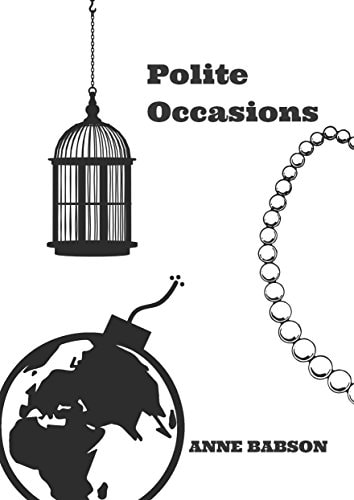- Poetry
- >
- Polite Occasions by Anne Babson
Polite Occasions by Anne Babson
Polite Occasions writes back both to Revelation and Emily Post because it imagines the future is female, that she is a lady, and if the human race Is to survive what evangelical Christians call “end times,” it will be because ladies have decided to make unladylike plans. This collection is largely set in a dystopian near-future world where political structures have become authoritarian and many feel spiritually adrift, all while most people pretend not to notice. It examines the ways in which silence renders people complicit with oppression in all its forms. It earnestly explores faith through doubt and disappointment. It might even be called a Christian poetry collection, though it is surely one that some right-wing Christians would like to burn. It is an unapologetically feminist work as well, one that understands that the oppression of women often gets enacted in the name of false gods.
The poems of this collection speak their exhortations to the reader in both formal and free verse in a high vernacular that considers contemporary life in reference to much older texts. Some of the works of this collection have won prizes, and many have been published in journals in North America, Europe, and Asia. The collection stands as a warning to both the faithful and faithless that we live in an era where we might fall under an Orwellian regime infused with religious language and that democracy might fall while we take selfies.
Details
Genre: Poetry
Release Date: March 31, 2018
Also available on Amazon.
What People Are Saying About Anne Babson's Polite Occasions
These poems are generous and ambitious, sometimes intricately whittled, sometimes Whitmanian, deeply American but defying borders, telling stories to keep the reader wondering all night.
-- Marilyn Hacker
The mothers and foremothers of Polite Occasions sought stability in a violent, patriarchal world with the rules laid out in etiquette books. Their daughters interrogate that inheritance of calling cards, tea dances, watercress sandwiches, and wedding china as their world hurtles ever faster toward apocalypse. The tender heart of this astonishing collection is the 15-poem lyric sequence "The Unborn," addressed to five imagined children who will never be brought forth into the "smoldering black hole" of the present. This is a book of revelations for our own age.
-- Jule Kane
Anne Babson writes intersections between old texts and contemporary life. For my opera Lotus Lives, she imagined the conjunction of a traditional Chinese folk tale and a hip- hop anthem. In her book The White Trash Pantheon, Greek gods swapped Olympus for a Gulf Coast trailer park. In “Vineland,” she soothes you with a Nordic ode to nature then bear - hugs you with shouts of welcome.She understands, just as I do in my work, that good art shouldn't forget the past as it innovates.
— Su Lian Tan, Internationally acclaimed composer
Anne Babson has a distinct gift for transporting her readers to the word worlds she creates, worlds thick with dense, rhythmic imagery and energy. In "AT THAT TIME IN THE CITY," Babson weaves romance with dystopia at a perfect pace, "They were in love, this was an adventure, and at that time in the city, the bitterness had not yet Descended in its fine black powder that comes up to swim in the polluted summer." Timely and powerful, this poem portrays a pair of lovers amidst a clueless populace, running along the edge of destruction, the old world teetering on the brink even as they hold hands through the city streets. Similarly, "AFTER THE GREAT SPEECH," and "PATMOS LYRIC #4" create windows into scenes simultaneously lovely and repulsive, using fearless, muscular language. Poetry for the bravest among us.
-- Sarah Beth Reddick
What I really enjoyed in Polite Occasions is the careful, subtle use of humor in describing scenes of sadness and dark commentary on the current scene. Rather than have the poems as a set-up for a punchline, a la Brautigan, Ms. Babson uses small dashes of wit as a light garnish. The "Recounting of a Polite Occasion", and "How To", are particularly good examples. The "Aging Bond Girl Calls Her Best Friend", on the other hand, takes a superficially comic premise and mines it for notes of regret for a life melodramatically lived.
To sum up, I very much enjoyed Ms. Babson's book and need to catch up on her previous works.
-- Christopher Moran
In Babson’s review of etiquette, we find disguised sequences on what it means to be and to bless the stranger. The collection’s invitation to reconsider women’s still contradictory roles in light of the inescapable weight of both feminist and biblical heritages is too tempting to turn down. Addresses such heady themes as hypocrisy, sin, theodicy, and tradition with a humor and irreverence that still manages to explore these larger questions with aplomb. A truly singular voice among America’s living poets in her expert blending of wit, prophetic wisdom, and feisty political commentary.
--Dr. Scarlett Cunningham
In “Wedding Dishes,” I like how the speaker gives both honor and spite to the plates and to the bride who originally received them. I am struck by the themes of preservation and continuation versus stewardship and use, waiting versus acting, coldness versus sensuality. One bride hides away the plates for a future that never arrives, preserving the dishes at the moment of receiving them (meanwhile her virginity, once upon a time preserved, has been lost forever); the other brings the plates into the cycle of serving, eating, sharing, and enjoying that is part of a life of communion and family. The bloodless blue of the plates reflects the first bride’s lifelessness, a life empty of joy and filled with fear and waiting; this color is both eclipsed and redeemed by the blood-red hues of the foods served by the second bride. Her generosity and willingness blot out her predecessor’s tightfistedness.
--Andrea Waitt
